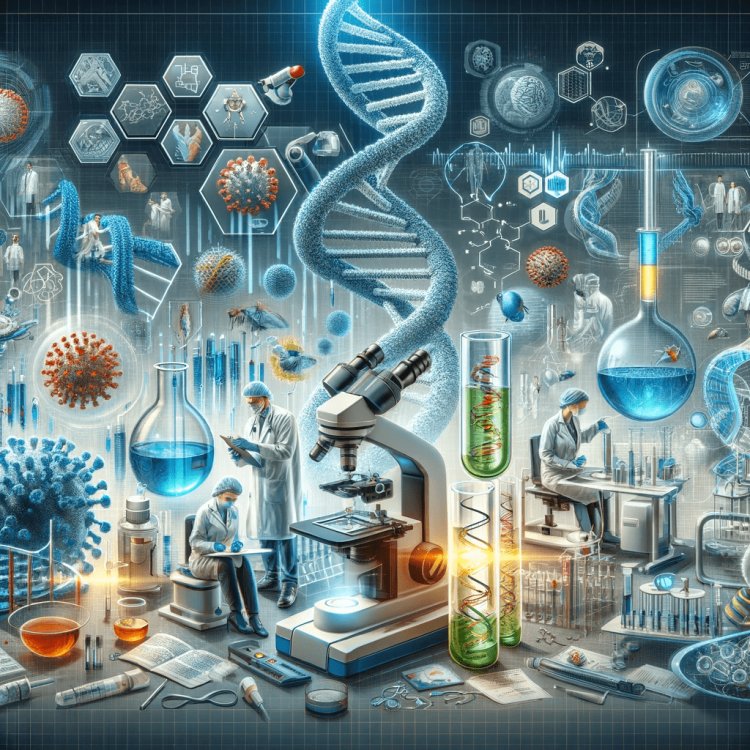The Future of Biotechnology: Gene Editing Technologies and Medical Breakthroughs
delves into the latest developments in gene editing technologies and biotechnology within the field of medicine. Explore how genetic diseases are being treated, disease risks are mitigated, and personalized therapies are being developed.

Biotechnology has become an integral part of modern medicine, revolutionizing the way we approach healthcare. One of the most significant advancements in this field is the rise of gene editing technologies. Gene editing involves altering or modifying genetic material using a variety of molecular techniques. These technologies are employed to treat genetic diseases, reduce disease risks, and even develop personalized therapies for the human body.
One of the key players in gene editing technologies is CRISPR-Cas9. CRISPR, which stands for Clustered Regularly Interspaced Short Palindromic Repeats, works in conjunction with Cas9, a specialized RNA and protein complex derived from the immune systems of microbes. This system allows for precise targeting and editing of specific genetic sequences within an organism's DNA.
The potential of CRISPR-Cas9 and other gene editing tools in the realm of medicine is vast. One of the most promising applications is in the treatment of genetic diseases. Conditions such as cystic fibrosis, sickle cell anemia, and muscular dystrophy, which are caused by specific genetic mutations, could potentially be cured or alleviated through gene editing. Researchers can use these tools to correct the genetic defects responsible for these diseases, offering hope to millions of patients worldwide.
Beyond treating genetic diseases, gene editing technologies have opened up new avenues for preventing and managing various medical conditions. For instance, they can be employed to modify the genes associated with a higher risk of cancer, thereby reducing an individual's susceptibility to the disease. This approach is known as gene therapy, and it holds the promise of preventing diseases before they even manifest.
Additionally, gene editing techniques can be used to enhance the immune system's capabilities. By editing immune cells to make them more effective at targeting and destroying cancer cells or pathogens, researchers are developing innovative cancer immunotherapies and personalized treatments for infectious diseases.
In the field of regenerative medicine, gene editing plays a crucial role in the development of tissue and organ transplantation. Scientists are working on creating genetically modified organs that are less likely to be rejected by the recipient's immune system. This could potentially address the shortage of organ donors and save countless lives.
Furthermore, gene editing technologies are contributing to the understanding and potential treatment of complex diseases with a genetic component, such as Alzheimer's and Parkinson's disease. Researchers can edit genes associated with these conditions in laboratory models to gain insights into disease mechanisms and test potential therapies.
The ethical implications of gene editing technologies in medicine are a subject of ongoing debate. While the potential benefits are immense, there are concerns about unintended consequences, the potential for misuse, and the need for robust regulatory frameworks to ensure responsible use.
In recent years, CRISPR-Cas9 has made headlines for its use in human embryos for germline editing. This raises ethical questions about the ability to engineer future generations with specific genetic traits and the potential for unintended consequences.
Despite the ethical dilemmas, it's clear that gene editing technologies and biotechnology are reshaping the landscape of medicine. As research continues and our understanding of genetics deepens, we can expect to see more innovative and targeted treatments that address the root causes of diseases, leading to improved healthcare outcomes for individuals around the world.
In conclusion, gene editing technologies are at the forefront of biotechnological advancements in the field of medicine. They hold immense potential for treating genetic diseases, reducing disease risks, developing personalized therapies, and advancing our understanding of complex conditions. While ethical concerns persist, the future of biotechnology in healthcare is undeniably exciting, promising better and more tailored treatments for patients.
What's Your Reaction?




















